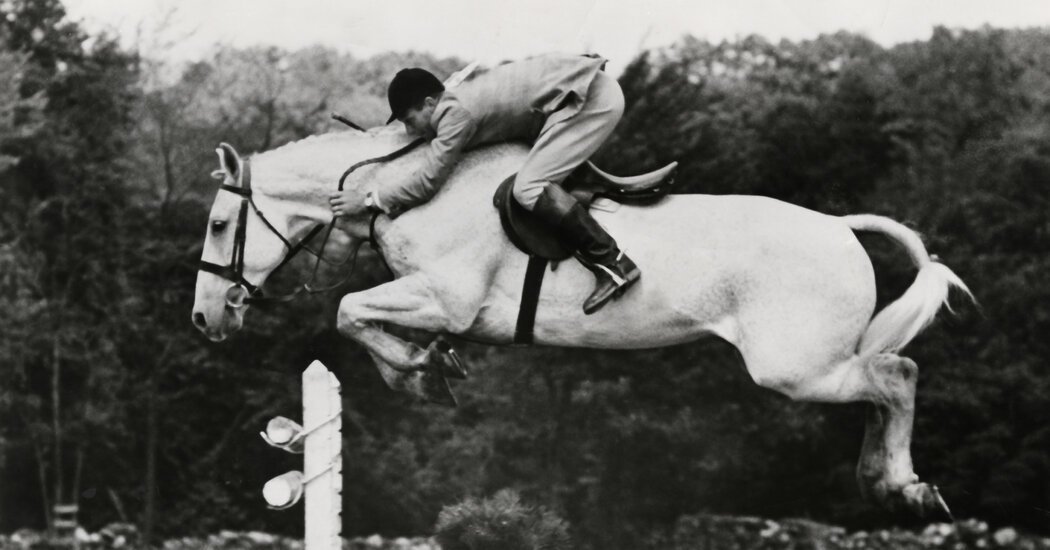He looked like a whisper of a horse grey and faded like the pages of a forgotten book, his coat dulled by time and hardship. Under the sterile glare of the auction-house lights, there was no glint, no glimmer of promise. Just a tired frame, a lowered head, and the invisible weight of almost being forgotten.
Maybe that’s why no one bid on him. Maybe that’s why he lingered in the shadows, long after the final gavel echoed through the hall. And maybe that’s why the truck — that terrible, growling truck that waited like a final chapter — still had room left in its belly. Room for horses that didn’t sell. Horses like him.
He wasn’t alone in his fate, which was a kind of comfort. Horses are social creatures. They are not built for solitude. They speak in silent glances, in the shuffle of hooves, in the twitch of an ear. They crave connection.
And then came a man.
The horse — as was his nature by now — barely reacted. Men came and went. Always moving. Always shouting. Some of them brought feed. Some brought fear. They were blobs, indistinct and interchangeable. This one was just another blob.
“I’ll take that one,” the new blob said, pointing.
“Eighty bucks,” replied another blob with a shrug. That shrug might have sealed the horse’s fate, or saved it.
“Does he have a name?” asked the man-blob.
A shrug again. That was that.
The horse didn’t know what the words meant, but he felt something shift inside — a loosening, a release, like he had just sidestepped something sharp and final. He wasn’t going on the truck. He was going with the man. That felt right.
He followed.
The Horse With No Name Gets a New Start
The new man was different. He spoke softly. He moved with intention. He named the horse Snowman — a curious name, the horse thought, but solid. Noble, even. Maybe it meant something strong, something important.
And Snowman liked the way it sounded. Even if he didn’t understand the word, he understood the warmth behind it. He also liked being told he was a “good horse.” Horses know tone. They know kindness.
Snowman proved himself quickly. He was reliable, gentle, and had a heart like a bonfire — quietly burning, always ready. His new job was helping humans learn to ride. A challenge, truly, because humans are — let’s be honest — a bit daft. They spook easily, think too much, and don’t listen with their bodies the way horses do.
Still, Snowman was patient. He knew how to carry fear, to soothe it under his steady gait. He knew how to forgive clumsy hands and nervous feet.
And then, one day, everything changed.
The Mistake That Sparked a Legend
For some reason known only to blobs, the man sold Snowman to a neighbor.
Snowman didn’t know he’d been sold. To him, it felt like a mistake. Surely his man would fix it soon. He just had to show him. Humans often needed help seeing the obvious.
So, Snowman did the unthinkable — he jumped the fence. And not a little paddock gate, either. A proper, grown-up fence. Several of them.
Then he trotted home, tail arched like a flag, hooves clattering with pride. He was back.
The man-blob looked out the window and blinked. Snowman blinked back.
The message, however, did not land immediately. Snowman was returned to the neighbor. So, he jumped again. And again.
The fences laughed at him, dared him, tried to trap him — but Snowman leapt over them with glee. It became a bit of a game. A puzzle. A declaration.
“I belong here,” he seemed to say.
The Discovery: A Jumper in the Dust
Eventually, the man saw it: this horse was something special. Not just loyal. Not just clever. He could fly.
Snowman began formal training in showjumping, an elite equestrian sport where skill, trust, and athleticism combine. He took to it like a horse already half in love with fences — not for their limits, but for the challenge.
With each competition, Snowman soared. The $80 horse, once bound for slaughter, began to earn accolades. He won hearts and trophies, most famously the Triple Crown of showjumping — a title reserved for the elite of the elite.
Crowds came to see him. Children cheered his name. Snowman, the underdog, the outsider, became a national hero. He was proof that greatness can wear a dusty coat and stand quietly in a corner.
Legacy of a Champion
Snowman’s story is more than a heartwarming tale — it’s a reminder of second chances, of potential hidden in plain sight, of the magic that happens when someone believes in the overlooked.
Born in obscurity, nearly lost to the brutal fate of slaughter, he became a champion by simply being himself — determined, gentle, and full of quiet fire.
His owner, Harry de Leyer, didn’t see a future champion at first. He saw a horse worth saving. That was enough.
Together, they rewrote what was possible. And in doing so, they earned a place in history.
Snowman passed away in 1974, but his story lives on in books, documentaries, and the hearts of horse lovers around the world. Harry de Leyer passed in 2021, leaving behind not only a legacy of horsemanship but a lesson in vision, humility, and the power of believing in the forgotten.
A Final Word from the Horse
If Snowman could speak, perhaps he’d chuckle at the fuss. He’d swish his tail and blink slowly, like horses do. Perhaps he’d nudge his ribbons aside to reach a carrot or rest his muzzle against the shoulder of the man who saw him — really saw him — when no one else did.
And if he had words, maybe they’d be simple: I was a good horse. I only needed someone to notice.
Based on a True Story
Yes, Snowman was real. He was bought for $80 by Dutch immigrant Harry de Leyer in the 1950s, just moments before being shipped to slaughter. He became one of the most celebrated showjumpers in U.S. history, winning the Triple Crown and inspiring countless equestrians. His story has been told in books like The Eighty-Dollar Champion and lives on as a symbol of resilience and hidden greatness.
To Mr. de Leyer — apologies for the “blob” nickname. It’s just how Snowman might have seen things. With love and wry affection, always.




